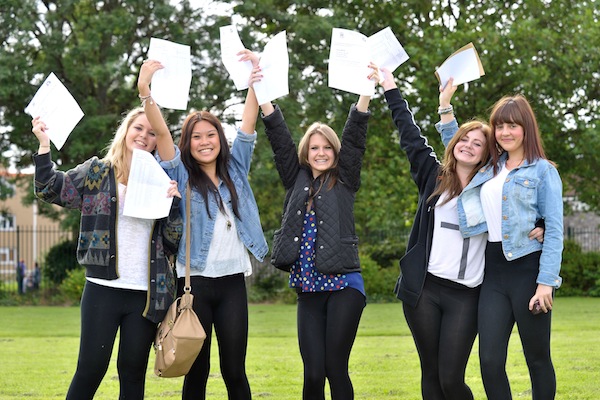For the first time in the history of GCSE exams, this year’s results have seen a decline in grades. Today, the Joint Council for Qualifications, which represents exam boards, announced that the number of papers marked A*-C has dropped from 69.8 per cent last year to 69.4 per cent. A grades have dropped by 0.8 per cent while A* grades are down by 0.5 per cent and C grades also down 0.4 per cent.
Since GCSEs were first set in 1986, rising grades each year may have been welcomed by the pupils receiving them, but have led to concerns about grade inflation. To address this, the exams regulator Ofqual has placed extra pressure on examiners as well as curbing the modular aspects of some exams. There are also accusations from teachers that English GCSE grades have been marked down in an effort to curb grade inflation.
Michael Gove has imposed more rigorous standards on schools, with four in ten pupils needing to gain five ‘good’ passes. Judging by today’s results, 250 secondary schools have failed to achieve this target. There are also figures from individual exam boards which suggest traditional subjects are making a comeback. Entries for biology, chemistry and physics and history all increased this year.
But many disparities remain across the secondary education system, which is currently undergoing a huge transformation. In this week’s podcast, Fraser Nelson and Neil O’Brien, director of the think tank Policy Exchange, discussed the many compounding factors that continue to affect pupils’ grades. You can hear the full discussion using the embedded player:
The first factor Fraser discussed is the effect of rich and poor locations, based on research done by Chris Cook in the Financial Times. Our leader in this week’s magazine explains this link:
‘Parents have long known about this link, which is why so many go to such lengths to rent property in more affluent catchment areas a year before their child is enrolled in school. But the full extent of England’s horribly unfair system was demonstrated recently in a study by the Financial Times. It plotted pupils’ wealth against their exam results, and found a near-perfect correlation. The richest can expect, on average, straight Bs in their GCSEs, while the poorest can expect straight Ds. Proof, if any were needed, that the comprehensive education system has become the greatest enemy of social mobility.
Neil presented some interesting statistics showing the effect poverty can have on results.
‘Poverty clearer matters a lot. For poor kids on free schools meals, and whose parents are on benefits, only 3 out of 10 of them will get 5 decent GCSEs including English and Maths. For other kids, twice as many will get good GCSEs’
Ethnicity is another factor too:
‘Poor white boys are the lowest performing group in our school system, less than a quarter of them will get five decent GCSEs. Among equivalently poor Asian kids, more than 40 per cent will get five decent GCSEs. In equivalent poor Chinese kids, 60 per cent will get five decent GCSEs. This tells you something about the importance of culture.’
He also explains the male-female divide is as prevalent as ever:
‘When they start school at age 5, girls and boys are doing equivalently well. But by the time we get to GCSE, girls are 7 per cent more likely to get good GCSEs.The anti-education male culture obviously matters a a lot
And as Fraser suggests, the school itself can make a huge difference:
‘Schools matters a lot. Even in Chris Cook’s analysis, which is incredibility bleak in lots of way, about 15 per cent of schools are managing to get their poor pupils up to the national average. It can be done, it’s just not that many schools are doing it at the moment.’
This is the biggest issue facing the government — how to replicate these improvements across the country. Both Fraser and Neil said that pushing forward the academy programme and adding a profit incentive is the most effective way to address the factors above.
The concern is what happens at the general election. Fraser said he believes it is ‘more likely than not’ that David Cameron will not win in 2015. If this happens, will Labour have the nerve to stand up against the unions and pick up and run with Gove’s agenda?






Comments